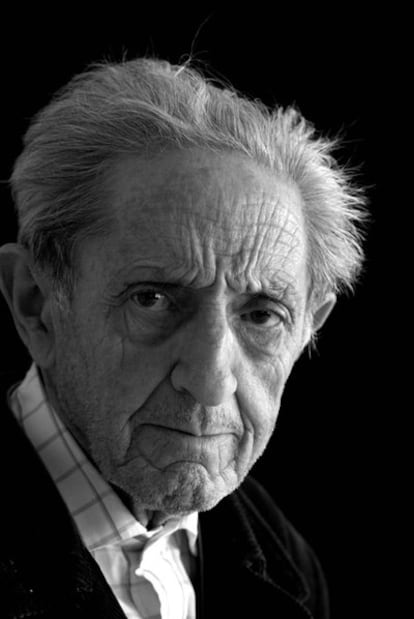Isaac Díaz Pardo Staunch defender of Galician language, culture dies at 91
The son of a Civil War atrocity victim, he worked tirelessly to reconstruct a local culture under threat
Isaac Díaz Pardo, one of Galicia's great painters and an early champion of the region's culture, died on Thursday at the age of 91 in Santiago de Compostela. After the Transition, Díaz Pardo embarked on a mission to remind people not to forget the victims of the Spanish Civil War and the 36 years of repression that followed under the Francisco Franco dictatorship; especially the attempts to eradicate the local language of the northwest region.
In July 1936, his father, Camilo, a well-known painter and illustrator, was "taken for a walk" by fascist forces while Díaz went into hiding for several days until he could flee Santiago de Compostela. In one of his last interviews, given to the Historical Memory Commission, Díaz recalled that the long-distance bus that took him to A Coruña had to stop every so often because of the dead bodies blocking the roads. "They didn't leave them in the ditch but instead left them out in the open to frighten people," he said.
His father had been one of the founders of the pro-Galician independence and cultural movement Irmandades da Fala (Brotherhoods of Conversation), a fraternity made up of the region's important intellectuals at the time, including writer Castelao, and which promoted a single language and culture in the region.
Camilo was shot dead at the start of the Civil War, along with other pro-Galician nationalists.
Díaz would always remember the "martyrs" of the civil war and decided early on to continue their personal missions to defend all things Galician. That is why at age 28, after studying art in Madrid and Barcelona, he chose to give up his painting career. There were more important things to do, he would later explain when asked about his decision.
Just like writer Luis Seoane, a friend and partner who devoted all of his time to Galician and leftist causes, Díaz wanted to reconstruct, strengthen and preserve Galician culture. He did it through a number of projects, including art dealing, becoming a Galician-language editor, working as an industrial art designer - he designed the stained glass in Galicia's parliament chamber - and writing. Diáz was successful in all fields except - as he would later say - starting up his own newspaper, Galicia.
In 1963, he began work on a Galician cultural center in Argentina, along with his friend, Seoane, who was living there in exile. Díaz was a humble man who always played down the importance of the number of recognitions and prizes he was awarded over the years. Some years back, when he was turned away in Ourense at one award ceremony in his honor, he left quietly without clarifying that he was the person the event was staged for.
He always seemed available to collaborate on many projects (Díaz once said he edited more than 1,500 books on Galician history and culture) and he had a keen eye for good business. "Did you know there's a guy in A Coruña who knows how to sell low-cost clothes without the need of having to distribute them at a department store?" some of his closest collaborators would often hear him ask with admiration about fellow Galician Amancio Ortega of Inditex before the Zara brand took off.
On December 22, he was admitted to the San Rafael Hospital suffering from pneumonia. When he asked the nurses to keep his visits to a minimum, they asked him how because there were so many. "Spread out the visits," he responded.

Tu suscripción se está usando en otro dispositivo
¿Quieres añadir otro usuario a tu suscripción?
Si continúas leyendo en este dispositivo, no se podrá leer en el otro.
FlechaTu suscripción se está usando en otro dispositivo y solo puedes acceder a EL PAÍS desde un dispositivo a la vez.
Si quieres compartir tu cuenta, cambia tu suscripción a la modalidad Premium, así podrás añadir otro usuario. Cada uno accederá con su propia cuenta de email, lo que os permitirá personalizar vuestra experiencia en EL PAÍS.
¿Tienes una suscripción de empresa? Accede aquí para contratar más cuentas.
En el caso de no saber quién está usando tu cuenta, te recomendamos cambiar tu contraseña aquí.
Si decides continuar compartiendo tu cuenta, este mensaje se mostrará en tu dispositivo y en el de la otra persona que está usando tu cuenta de forma indefinida, afectando a tu experiencia de lectura. Puedes consultar aquí los términos y condiciones de la suscripción digital.








































